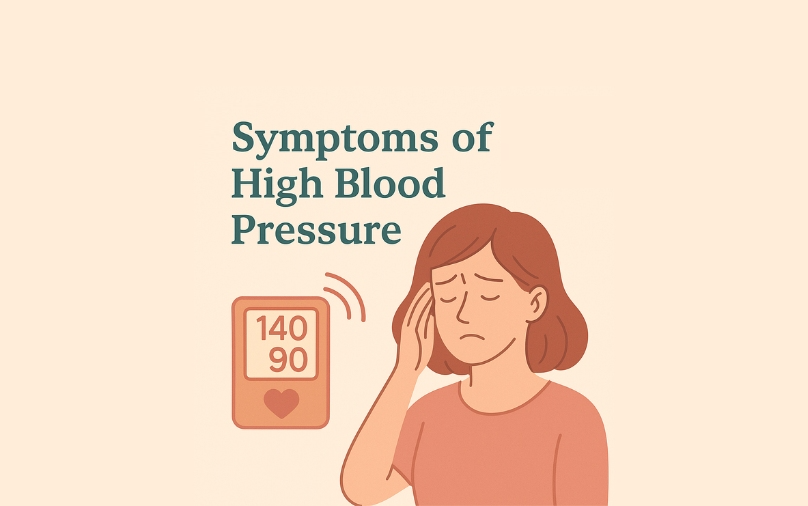Many people ignore small signs like headaches, tiredness, or shortness of breath. They think these are common and will go away with rest. However, these symptoms often point to something more serious. High blood pressure, also called hypertension, affects the body quietly. It grows slowly and harms your heart, brain, and kidneys without showing early warning signs. By the time most people notice, the damage has already started.
Learning to identify these early symptoms helps you protect your health and take timely action. Regular preventive check-ups at a trusted medical care centre can help detect problems early and guide you toward better health management and chronic care.
Why High Blood Pressure Needs Early Attention
High blood pressure, also known as hypertension, is a condition where the force of blood against your artery walls remains consistently high. Over time, this pressure damages the arteries and places extra strain on the heart, kidneys, and brain. It often develops silently and does not cause symptoms until it reaches a severe stage.
Ignoring these early signs can lead to chronic conditions such as heart disease, kidney damage, or stroke. This is why doctors often call hypertension a “silent threat.” Regular preventive check-ups allow you to detect these changes early and maintain a healthy balance through proper chronic care and lifestyle adjustments.
1. Headaches That Keep Coming Back
If you often wake up with a heavy head or feel a throbbing ache that refuses to go away, your body may be trying to tell you something. High blood pressure increases the pressure inside your arteries, which can also affect blood flow to your brain. This creates tension in the surrounding nerves and blood vessels, leading to frequent headaches.
These headaches usually feel stronger in the morning or after a stressful day. Many people take painkillers and move on, but the real issue remains unchecked. If headaches become part of your daily life, schedule a preventive check-up to confirm whether your blood pressure is the underlying cause.
2. Frequent Dizziness or Lightheadedness
Many people experience dizziness after standing up suddenly, but when it occurs frequently or lasts longer, it may point to high blood pressure. Dizziness occurs when the brain does not receive enough oxygen because the blood flow becomes restricted. Some people also feel a spinning sensation or weakness in their legs. Ignoring this symptom can be dangerous because it may lead to falls or fainting. Therefore, as a trusted medical care center in Brooklyn, we advise that if you notice this feeling becoming frequent, you visit your doctor for a detailed check-up and have your blood pressure and circulation evaluated.
You can also make minor lifestyle adjustments to improve balance and blood flow. Drink enough water, eat meals on time, and avoid long gaps between rest and activity. Gentle physical movement, such as walking or stretching, helps keep oxygen flowing evenly throughout your body.
3. Blurred or Distorted Vision
Your eyes are sensitive to even the smallest changes in blood flow. High blood pressure can damage the delicate blood vessels in the retina, which is the layer at the back of your eye that captures images. When these vessels weaken or swell, your vision becomes blurry or distorted. Some people also see dark spots or flashes of light, which indicate retinal strain.
If your eyesight changes suddenly or your vision becomes unclear, get your blood pressure measured immediately. Early diagnosis helps prevent further damage and protects your eyesight.
4. Breathlessness During Everyday Activities
When high blood pressure affects your heart, it reduces its ability to pump blood effectively. This makes it harder for oxygen to reach your lungs and other organs. As a result, you may feel short of breath even while climbing a few stairs or taking a short walk. Some people experience this even while lying down, which indicates that the heart is under strain.
Shortness of breath also signals fluid buildup in the lungs, which is a serious warning sign. Do not ignore this symptom. Visit a medical care centre immediately if breathing becomes difficult or irregular. Early intervention through proper health management can prevent severe heart or lung complications.
5. Chest Pain or Tightness
Chest pain is one of the most serious symptoms linked to high blood pressure. It happens when the arteries that supply blood to your heart become narrow or stiff. The heart struggles to get enough oxygen, which leads to pain or a tight feeling in the chest. Some people describe it as heaviness or squeezing, while others feel pressure spreading toward the shoulders, neck, or arms.
If you experience chest pain along with sweating, nausea, or dizziness, you must seek emergency care immediately. Ignoring chest pain can lead to heart failure or a heart attack. Timely medical attention at a medical care centre can identify the cause and prevent life-threatening events.
6. Unusual Tiredness or Irregular Heartbeats
If you feel constantly exhausted even after resting, it may not be just work stress. High blood pressure forces your heart to pump harder to move blood through stiff or narrow arteries. This constant strain drains your energy and makes you feel unusually weak. You may also sense irregular heartbeats, fluttering, or a racing pulse at times. These sensations show that your heart is struggling to maintain its normal rhythm.
Ignoring this symptom can lead to serious heart complications. A preventive check-up at a trusted medical care centre helps evaluate your heart’s function and blood pressure levels. Once doctors identify the cause, they can suggest the right healthcare plan.
7. Nosebleeds Without Any Clear Reason
Nosebleeds can happen to anyone, especially in dry weather, but frequent or sudden bleeding without injury can point toward high blood pressure. When the pressure in your arteries rises sharply, it can cause the tiny blood vessels in your nose to burst. This leads to bleeding that may stop on its own but tends to come back repeatedly.
While occasional nosebleeds are harmless, ignoring frequent ones can allow the underlying issue to persist. A preventive check-up at a medical care centre helps detect whether your blood pressure is rising suddenly or staying high for too long. Once your doctor identifies the reason, proper chronic care and consistent monitoring ensure your blood vessels remain strong and healthy.
Lifestyle Habits That Help You Manage Blood Pressure
-
- Eat a balanced diet: Include fruits, vegetables, whole grains, and lean proteins in your meals. Reduce intake of salt, sugar, and processed foods.
- Stay physically active: Walk, cycle, or practice yoga for at least 30 minutes daily to keep your heart strong.
- Sleep properly: Good sleep helps the body regulate stress hormones and maintain steady blood pressure.
- Drink enough water: Proper hydration improves circulation and prevents pressure fluctuations.
- Avoid smoking and alcohol: These habits damage arteries and make blood pressure harder to control.
- Manage stress: Relax through deep breathing, meditation, or outdoor activities that calm your mind.
- Avoid smoking and alcohol: These habits damage arteries and make blood pressure harder to control.
- Drink enough water: Proper hydration improves circulation and prevents pressure fluctuations.
- Sleep properly: Good sleep helps the body regulate stress hormones and maintain steady blood pressure.
- Stay physically active: Walk, cycle, or practice yoga for at least 30 minutes daily to keep your heart strong.
- Eat a balanced diet: Include fruits, vegetables, whole grains, and lean proteins in your meals. Reduce intake of salt, sugar, and processed foods.
These healthy choices strengthen your heart and help you naturally control your blood pressure.
When to Seek Medical Help
If you notice any of the symptoms mentioned above or if your readings consistently exceed 130/80 mmHg, consult a healthcare provider right away. Early treatment prevents complications and helps maintain a healthy lifestyle. Regular monitoring, medication (if prescribed), and guided care from your doctor can make a significant difference in your long-term health.
“According to the CDC, hypertension begins when blood pressure readings are consistently at or above 130/80 mm Hg. In contrast, the World Health Organization (WHO) defines high blood pressure as 140/90 mm Hg or higher.”
Final Thoughts!
High blood pressure grows quietly, but its effects can be severe if you ignore the warning signs. Headaches, dizziness, chest tightness, or unexplained tiredness may all point toward an imbalance that needs attention. Regular preventive check-ups give you the knowledge and support you need to manage these symptoms before they become chronic problems.
If you want expert guidance and complete care, visit Local MD Medicare Center in Brooklyn. Our experienced team offers chronic care management, preventive health checkups, primary care, vaccinations, and much more under one roof to help you stay active, balanced, and healthy at every stage of life.



